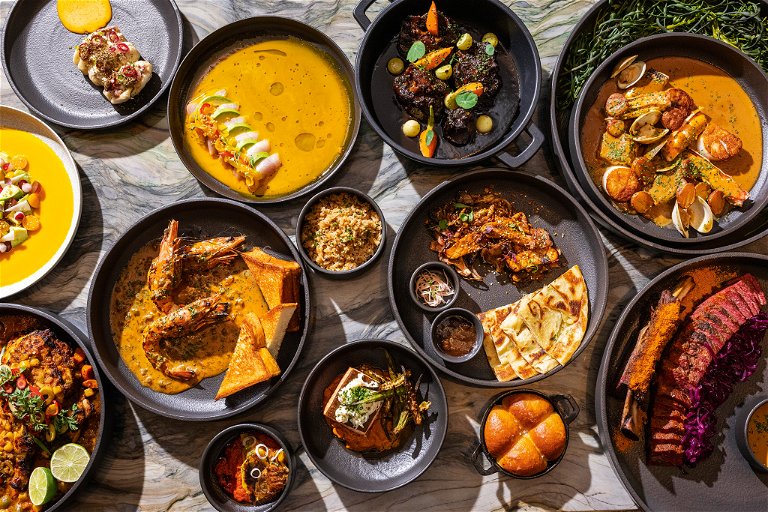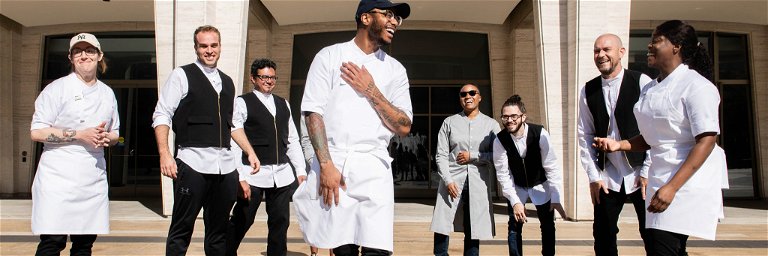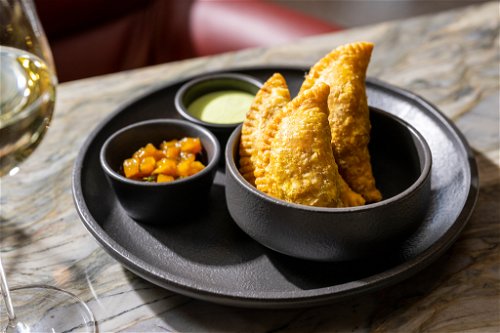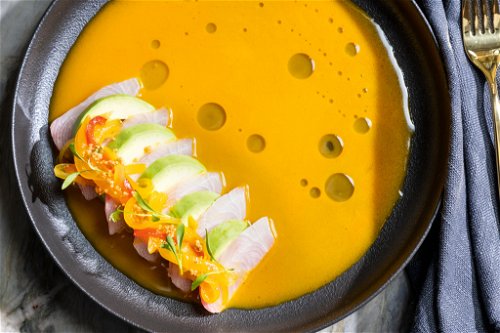Kwamw Onwuachi: The most sought-after chef in New York at the moment
Coming from a difficult background, his career is also a piece of African American U.S. history.
Phoenix from the ashes; at the age of 33, Kwame Onwuachi has reached the top. The "New York Times" voted his restaurant "Tatiana" the best restaurant in the city, and six months after opening in November 2022, Onwuachi also won the "One To Watch Award" from "World's 50 Best". This gives it a good chance of soon making the list of the 50 best restaurants in the world, the culinary Olympus. And it does so with cuisine that brings together Bronx influences and family culinary heritage from Nigeria, Jamaica and Louisiana in extraordinary Afro-Caribbean creations: egusi dumplings with rock crab, piri-piri salad with honeynut squash, black bean hummus with lamb.
Housed at Lincoln Center for the Performing Arts on New York's Upper West Side, "Tatiana" is housed in the spruced-up David Geffen Hall, the legendary concert hall where the New York Philharmonic performs. The renovation of the building complex cost $550 million. Not always was this area chic and expensive. In the past, when the neighbourhood was called San Juan Hill, immigrants from Africa and Puerto Rico lived here. But in the 1950s they were evicted and most of the old houses were demolished.

Growing up in the Bronx
The Bronx is not too far away - and yet a different world. This is where Kwame Onwuachi grew up. His parents divorced early, and his father beat him. "I was a pretty bad kid," the son says of himself. So his mother sent him to live with his grandfather in Nigeria, among the Igbo, one of the three largest ethnic groups in the multi-ethnic state, most of whom do not live in an affluent society. For two years the boy stayed there. "I learned not only to respect my ancestors, but also the earth and where my food comes from," Onwuachi recalls today. His mother was a cook and often out of the house, so the sister cooked for him. His restaurant is named after her, Tatiana. His childhood experiences shaped Onwuachi and his work in the kitchen, where teamwork counts. For the "Tatiana", for example, he hired a chef from a casino in Yonkers with no resume to speak of. Onwuachi's motto: "It's about taking care of each other and caring for each other."
When he returned from Nigeria, he initially made quick money on the street. But he found the jump. As a teenager, he sold candy on the New York City subway to fund his own catering business. He went to the Culinary Institute of America, one of the most prestigious culinary schools in the United States. During this time he worked at the three-star restaurant "Per Se," then at "Eleven Madison Park," both New York institutions. Onwuachi made a name for himself among American TV audiences in 2015 with the reality show "Top Chef". His career and easygoing manner were inspiring. Nothing seemed to stop him.

Dampers in D.C.
Then came Washington, D.C., where "Shaw Bijou" opened in late 2016, a high-end restaurant for the capital's elite, who had previously waited months for the place. For the first time in his life, Onwuachi was a chef himself, and disappointed expectations. The price for his 13-course tasting menu seemed presumptuously high to many, even more so for a newcomer. A "Washington Post" critic left $500 at the restaurant and craved a pizza afterward. Onwuachi changed his menu, lowered the price, but by then it was too late. After less than three months the restaurant had to close, the financing did not work out.
The young and hungry up-and-comer had wanted to be innovative at all costs, and in doing so had cooked past the guests' wishes. The success story hit a bump, but Onwuachi - like all successful people - drew the right conclusions from it. "I learned a lot," he explained at the time. What you say when a prestige project fails.
The fact that the criticism hit him harder than it first appeared, because it touched the core of his identity, can be read in Onwuachi's biography. It's called "Notes from a Young Black Chef." He is sure, he writes in it, that the reactions would not have been so severe if his skin had been lighter. Or if his food had been more in line with the New American or nouvelle cuisine of other top restaurants. Fine dining and people of colour, one can read the accusation, did not go together for many. But perhaps that is not the whole truth. The "Shaw Bijou" required chutzpah, and Onwuachi described himself as "brash, swashbuckling and a little arrogant." Probably for this reason, the gastronomic establishment did not find it difficult to gloat.
New start in slave port
Onwuachi's story tells of one who suffered many setbacks on his way up from the Bronx. And who has always grappled with what it means to be black and ambitious in a country dominated by whites, instead of dutifully standing in line.
From the ashes to which the "Bijou" decayed, Onwuachi returned like a phoenix to the culinary sky. In the "Hotel InterContinental" in Washington's The Wharf neighbourhood, he opened the "Kith/Kin" with Afro-Caribbean cuisine. Slave ships had once docked here to bring people like him in chains to America. "A place for dreamers," wrote Onwuachi, who believed "that their culture would one day be accepted as equal and significant." The restaurant received much praise, earning the chef a "James Beard Award" as "Rising Star Chef of the Year." He stayed until the Corona summer of 2020, then it was time for a new project: back to the roots, to New York City.
Perhaps a historically dazzling venue like Lincoln Center is just right for the culinary approach Onwuachi is taking; reinterpreting the familiar culinary influences of its Afro-Caribbean heritage in intriguingly exciting ways, with a team that works together as equals.
Tatiana" is not just a restaurant, but the future of fine dining, cheered "Forbes" magazine. And Onwuachi himself? Stay hungry without losing your sense of fun. In the end, that's what he's all about. When guests leave his restaurant, their cheeks should ache with laughter, he once said. By the way, he wants to return to D.C. this year - the next milestone is waiting.
"Soulfood"
African American chefs define their own culinary identity through special ingredients, flavours and spices.
"Soulfood" is the unofficial term for African-American cuisine in the United States. It is as diverse as the population group itself. Its origin lies in the forced migration and enslavement of Africans from the 17th century. African-American cuisine therefore arose from a lack, usually contained a lot of fat and sugar to improve the taste of the previously often rather inferior food. Rather unpleasant cuts of meat such as offal, pigs' feet and ears, or chicken wings were mainly stewed or deep-fried, and vegetables were often steamed with lard. And just as the European conquerors once did, the enslaved Africans brought spices, food and cooking techniques from their homeland.


